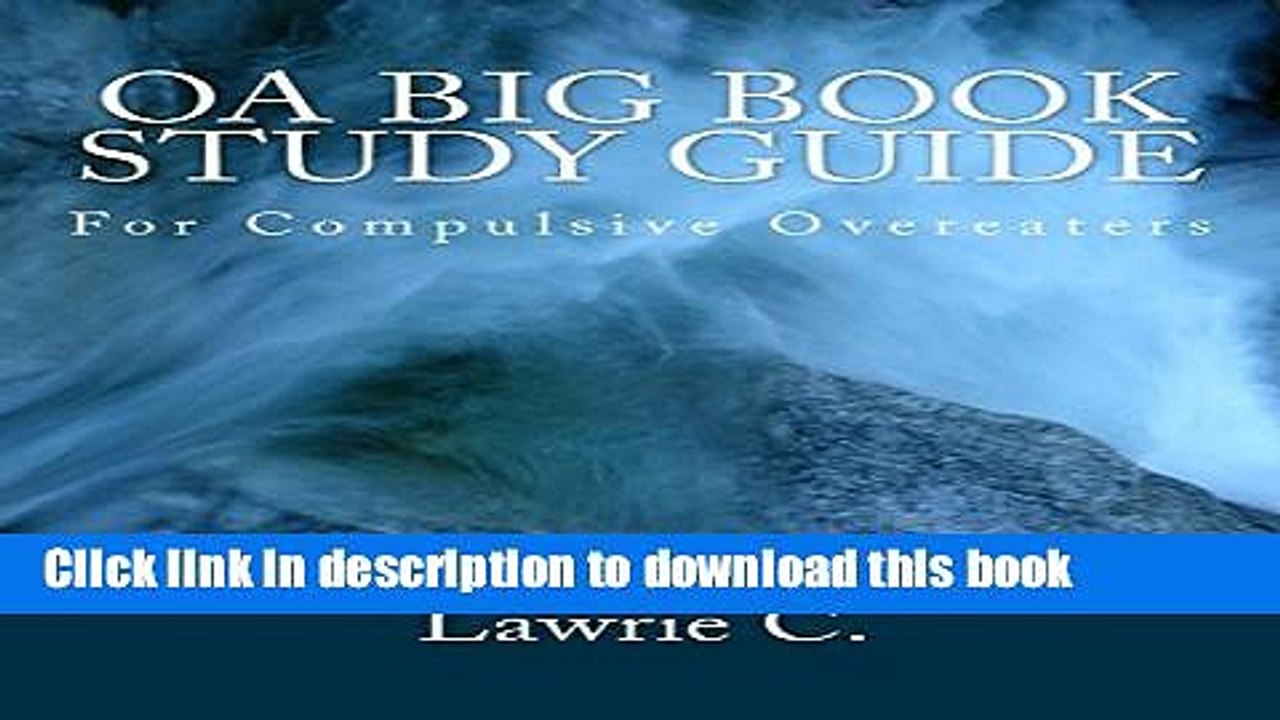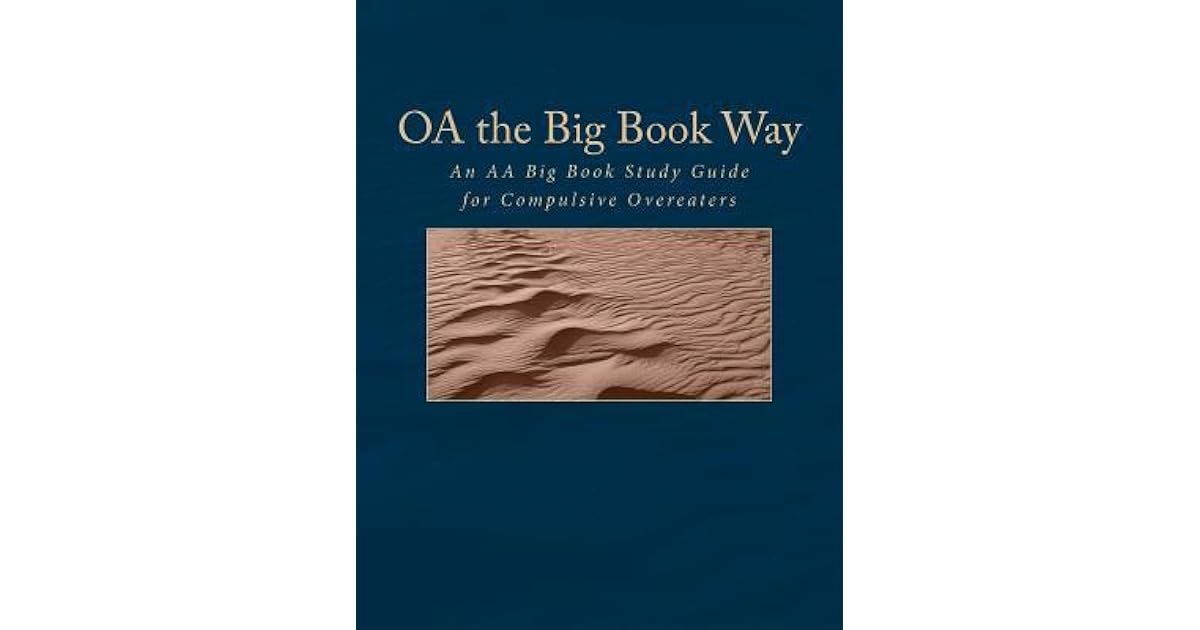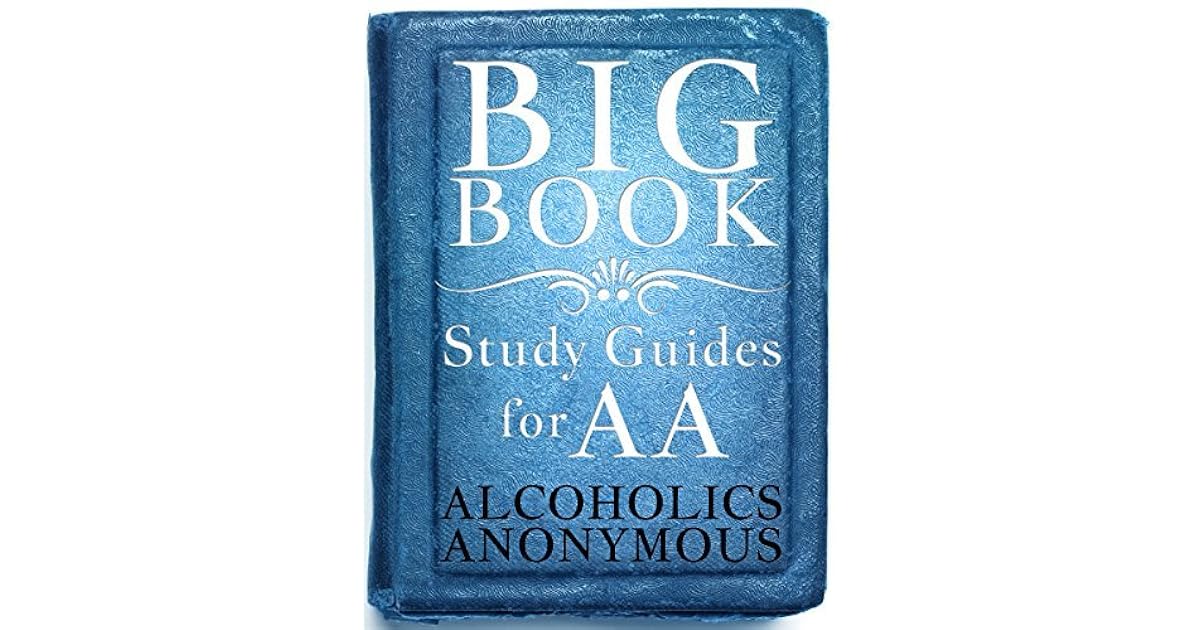An AA Big Book Study Guide for Compulsive Overeaters is an essential tool for those struggling with this challenging condition. This guide provides a comprehensive overview of the AA Big Book, exploring its key concepts, the 12 steps, and the importance of spirituality in recovery.
By delving into the wisdom of the Big Book, compulsive overeaters can gain a deeper understanding of their condition and develop effective strategies for lasting recovery.
The Big Book offers a wealth of insights and practical guidance for compulsive overeaters. It helps them identify the underlying causes of their compulsive eating, develop coping mechanisms, and build a strong support network. Through the 12 steps, compulsive overeaters learn to surrender their addiction, make amends for past mistakes, and cultivate a spiritual connection that empowers them to live a fulfilling life free from compulsive eating.
Introduction to Compulsive Overeating
Compulsive overeating is a serious eating disorder characterized by recurrent episodes of binge eating. Binge eating involves consuming large amounts of food in a short period, often until feeling uncomfortably full. Unlike bulimia, compulsive overeating does not involve purging behaviors such as vomiting, laxative use, or excessive exercise.
Compulsive overeating is a prevalent disorder, affecting approximately 3.5% of the adult population in the United States. It is more common in women than men and often co-occurs with other mental health conditions such as depression, anxiety, and substance abuse.
For those struggling with compulsive overeating, an AA Big Book study guide can provide valuable insights. Interestingly, there’s a book out there with an oxymoron in its title, a book with an oxymoron in the title . It’s a peculiar concept that prompts us to question the nature of language and meaning.
Nonetheless, returning to our original topic, an AA Big Book study guide for compulsive overeaters can help individuals understand the principles of recovery and work towards a healthier life.
Characteristics of Compulsive Overeating
- Recurrent episodes of binge eating
- Eating large amounts of food in a short period
- Feeling a loss of control during binge episodes
- Eating even when not hungry
- Eating alone or in secret
- Feeling disgusted, ashamed, or depressed after binge eating
Impact of Compulsive Overeating
Compulsive overeating can have a significant impact on an individual’s physical and mental health. Physically, it can lead to weight gain, obesity, and related health problems such as heart disease, stroke, and diabetes. Mentally, it can lead to low self-esteem, depression, and social isolation.
Compulsive overeating can also have a negative impact on society. It is estimated to cost the United States billions of dollars each year in healthcare costs and lost productivity.
The AA Big Book as a Study Guide
The Alcoholics Anonymous Big Book, also known as “The Big Book,” is the primary text used by Alcoholics Anonymous (AA) members. It was first published in 1939 and has since become a cornerstone of the AA program.
The Big Book is a collection of personal stories, experiences, and insights from early AA members. It provides a comprehensive overview of the AA program, including the 12 Steps and 12 Traditions. The Big Book also offers guidance on how to work the AA program and how to stay sober.
How the Big Book Can Be Used as a Study Guide for Compulsive Overeaters
The Big Book can be a valuable study guide for compulsive overeaters. It provides a wealth of information on the nature of addiction, the recovery process, and the importance of spirituality.
The Big Book can help compulsive overeaters to:
- Understand the nature of their addiction
- Learn about the recovery process
- Develop a spiritual foundation
- Find support from other compulsive overeaters
The Big Book is not a magic bullet, but it can be a powerful tool for compulsive overeaters who are serious about recovery.
Key Concepts in the Big Book for Compulsive Overeaters
The Big Book of Alcoholics Anonymous contains a wealth of wisdom and guidance that can be helpful for compulsive overeaters. By understanding the key concepts in the Big Book, compulsive overeaters can gain a deeper understanding of their condition and develop strategies for recovery.
One of the most important concepts in the Big Book is the idea of powerlessness. Compulsive overeaters often feel powerless over their eating, and this can lead to feelings of shame, guilt, and despair. However, the Big Book teaches that we are not powerless over our addiction, and that we can find recovery through a Higher Power.
The Twelve Steps
The Twelve Steps of Alcoholics Anonymous are a set of principles that can help compulsive overeaters recover from their addiction. The Steps involve admitting powerlessness over food, turning our will and our lives over to a Higher Power, making a searching and fearless moral inventory, admitting our wrongs to ourselves, others, and our Higher Power, making amends to those we have harmed, continuing to take personal inventory and when we are wrong promptly admitting it, seeking through prayer and meditation to improve our conscious contact with our Higher Power, asking only for knowledge of our Higher Power’s will for us and the power to carry that out, working to help others, and practicing these principles in all our affairs.
For those struggling with compulsive overeating, the AA Big Book Study Guide provides invaluable insights and support. Its comprehensive approach aligns with the experiences shared in a book written by an author in their 20s , offering a unique perspective on overcoming addiction and embracing recovery.
By delving into the Big Book’s principles, readers gain a deeper understanding of their own journey and find solace in the collective wisdom of those who have successfully navigated the path to sobriety.
The Importance of Fellowship, An aa big book study guide for compulsive overeaters
The Big Book also emphasizes the importance of fellowship in recovery. Compulsive overeaters can find support and encouragement from other compulsive overeaters who are working the Steps. Fellowship can help compulsive overeaters stay motivated and accountable, and it can provide a safe space to share experiences and learn from others.
Spiritual Awakening
The Big Book teaches that recovery is a spiritual process. Through the Twelve Steps, compulsive overeaters can experience a spiritual awakening that can help them to find peace, serenity, and joy. A spiritual awakening can help compulsive overeaters to let go of their addiction and to live a full and meaningful life.
The 12 Steps for Compulsive Overeaters
The 12 Steps of Alcoholics Anonymous (AA) have been adapted for compulsive overeaters and can provide a framework for recovery. The steps emphasize admitting powerlessness over food, recognizing a Higher Power, making a decision to turn over one’s life, taking a moral inventory, admitting wrongs, making amends, continuing to take inventory, praying and meditating, and carrying the message to others.
Sponsorship and Support Groups
Sponsorship is a crucial aspect of recovery for compulsive overeaters. A sponsor is a person who has successfully worked the 12 steps and can provide guidance and support to newcomers. Support groups, such as Overeaters Anonymous (OA), offer a safe and supportive environment where individuals can share their experiences and learn from others.
Spirituality and Recovery

Spirituality plays a crucial role in the recovery process for compulsive overeaters. It offers a sense of purpose, connection, and a higher power beyond oneself. By embracing spirituality, individuals can develop a deeper understanding of their addiction and find the strength to overcome it.
The 12 steps of Alcoholics Anonymous (AA) incorporate spirituality in several ways. Step Two acknowledges the existence of a higher power, while Step Three encourages individuals to surrender their will to that power. Step Eleven promotes regular meditation and prayer, fostering a connection with the divine.
An AA Big Book Study Guide for Compulsive Overeaters is a must-have for anyone struggling with food addiction. It’s a comprehensive guide that will help you understand the 12 steps and how to apply them to your own life. Just like the classic children’s book A is for Alice: An Alphabet Book , this guide will help you navigate the ups and downs of recovery with compassion and support.
So, if you’re ready to take your recovery to the next level, grab a copy of this guide today and start your journey to a healthier, happier life.
These steps emphasize the importance of seeking guidance and support from a source outside of oneself.
Incorporating Spirituality into Recovery
- Prayer and Meditation:Regular prayer and meditation can help compulsive overeaters connect with their higher power, find inner peace, and reduce stress.
- Mindfulness:Practicing mindfulness techniques, such as paying attention to the present moment without judgment, can help individuals become more aware of their triggers and develop healthier coping mechanisms.
- Service:Engaging in service to others can provide a sense of purpose and connection, while also helping individuals develop empathy and humility.
- Sponsorship:Having a sponsor who has successfully recovered from compulsive overeating can provide guidance, support, and a spiritual connection.
- Meetings:Attending AA meetings or other support groups can offer a sense of community and connection with others who are also working towards recovery.
Relapse Prevention
Relapse is a common experience for people in recovery from compulsive overeating. It can be discouraging, but it is not a sign of failure. Relapse is an opportunity to learn and grow. By understanding the common triggers for relapse and developing strategies for preventing it, you can increase your chances of maintaining long-term recovery.
Common Triggers for Relapse
- Stress
- Negative emotions (e.g., anger, sadness, boredom)
- Social situations (e.g., parties, gatherings)
- Exposure to food cues (e.g., seeing, smelling, or tasting food)
- Physical discomfort (e.g., hunger, fatigue)
- Cognitive distortions (e.g., “I can’t control myself around food,” “I’m a failure”)
Strategies for Preventing Relapse
- Identify your triggers and develop strategies for coping with them.
- Practice mindfulness and self-awareness to recognize when you are at risk for relapse.
- Build a strong support system of friends, family, and fellow members of your recovery program.
- Develop healthy coping mechanisms for dealing with stress and negative emotions.
- Avoid situations that you know will trigger your desire to overeat.
- If you do experience a relapse, don’t give up. Learn from the experience and make a plan to prevent it from happening again.
Resources for Compulsive Overeaters
Compulsive overeaters can find support and guidance from a variety of resources, including support groups, treatment programs, and online resources. These resources can provide a safe and supportive environment for individuals to share their experiences, learn from others, and develop coping mechanisms.
Accessing these resources is essential for recovery. Support groups, such as Overeaters Anonymous (OA), provide a structured environment for individuals to connect with others who understand their struggles. Treatment programs offer professional guidance and support, while online resources can provide information and tools for recovery.
Dive deep into the AA Big Book Study Guide for Compulsive Overeaters, a powerful resource for recovery. Its pages offer a path to understanding and overcoming compulsive eating. If you’re curious about exploring more a or an interesting book , this guide is an excellent starting point.
Whether you’re new to the recovery journey or seeking further support, the AA Big Book Study Guide for Compulsive Overeaters will empower you with insights and guidance.
Support Groups
- Overeaters Anonymous (OA):OA is a 12-step fellowship for individuals with compulsive overeating. OA meetings provide a safe and supportive environment for individuals to share their experiences, learn from others, and develop coping mechanisms.
- Food Addicts Anonymous (FAA):FAA is a 12-step fellowship for individuals with food addiction. FAA meetings provide a safe and supportive environment for individuals to share their experiences, learn from others, and develop coping mechanisms.
Treatment Programs
- Residential treatment programs:Residential treatment programs provide a structured environment for individuals to focus on their recovery. These programs typically offer a combination of therapy, support groups, and nutritional counseling.
- Outpatient treatment programs:Outpatient treatment programs provide a flexible option for individuals who need support while maintaining their daily responsibilities. These programs typically offer a combination of therapy, support groups, and nutritional counseling.
Online Resources
- National Eating Disorders Association (NEDA):NEDA provides information and resources on eating disorders, including compulsive overeating. NEDA’s website offers a variety of resources, including a helpline, online support groups, and a directory of treatment providers.
- Eating Recovery Center (ERC):ERC provides information and resources on eating disorders, including compulsive overeating. ERC’s website offers a variety of resources, including a helpline, online support groups, and a directory of treatment providers.
Success Stories
In the annals of recovery from compulsive overeating, countless individuals have found solace and guidance in the pages of the AA Big Book. Their journeys, marked by both challenges and triumphs, serve as a beacon of hope for those seeking a path to recovery.
These stories of transformation and resilience offer invaluable insights into the power of the Big Book as a study guide for compulsive overeaters. They provide a roadmap for navigating the complexities of recovery, highlighting the essential principles that have guided countless individuals toward a life free from compulsive overeating.
Whether you’re a newbie or a seasoned veteran in the recovery journey, an AA Big Book study guide for compulsive overeaters can be a game-changer. Just like how an author’s 24th book can bring fresh perspectives to their literary legacy, a study guide can offer new insights into the Big Book’s timeless wisdom, helping you deepen your understanding and strengthen your recovery foundation.
Sarah’s Story
Sarah, a former compulsive overeater, found herself lost in a cycle of bingeing and purging. Her life was consumed by her obsession with food and her relentless self-criticism. Desperate for a solution, she stumbled upon the AA Big Book.
The AA Big Book Study Guide for Compulsive Overeaters is an invaluable resource for those struggling with this addiction. Its insights and practical steps can help you break free from the cycle of overeating. If you know someone who is incarcerated, you may also want to consider adding money to their books . This can help them purchase essential items and stay connected with loved ones.
The AA Big Book Study Guide for Compulsive Overeaters is a powerful tool that can help you achieve lasting recovery.
Through the Big Book’s teachings, Sarah began to understand the underlying causes of her compulsive overeating. She realized that her addiction was rooted in deep-seated emotional pain and a lack of self-worth. By working through the steps and connecting with a sponsor, Sarah gradually began to heal her emotional wounds and develop a healthy relationship with herself and with food.
John’s Story
John, a successful businessman, had always struggled with his weight. Despite numerous attempts at dieting, he found himself unable to break free from the cycle of overeating. It wasn’t until he joined an AA meeting that he realized the true nature of his addiction.
Through the support of the AA community and the guidance of the Big Book, John began to confront the emotional triggers that fueled his overeating. He learned to practice mindfulness, to identify and manage his emotions, and to develop healthier coping mechanisms.
With time and dedication, John transformed his relationship with food and achieved lasting recovery from compulsive overeating.
Conclusion

This study guide has provided an overview of the AA Big Book as a resource for compulsive overeaters. The key points to remember are:
The Big Book is a valuable tool for understanding the nature of compulsive overeating and the steps to recovery. It offers a spiritual approach to recovery that emphasizes the importance of honesty, humility, and service to others. The 12 Steps provide a framework for working through the challenges of recovery and developing a healthy relationship with food and eating.
For those grappling with compulsive overeating, an AA Big Book Study Guide can provide invaluable support. Similarly, delving into the perspective of animals through a book from an animal’s pov can offer a fresh lens on our own struggles. By understanding the motivations and experiences of non-human creatures, we may gain insights that can enrich our journey towards recovery.
Using the Big Book as a study guide can provide several benefits for compulsive overeaters. It can help them to:
- Understand the nature of their addiction and how it affects their lives.
- Develop a spiritual foundation for their recovery.
- Connect with other compulsive overeaters who are also working towards recovery.
- Find support and guidance from experienced members of the AA community.
If you are struggling with compulsive overeating, I encourage you to seek help and support. The AA Big Book can be a valuable resource on your journey to recovery.
Last Point

An AA Big Book Study Guide for Compulsive Overeaters is an invaluable resource for anyone seeking recovery from this debilitating condition. By embracing the principles and practices Artikeld in this guide, compulsive overeaters can break free from the chains of addiction and embark on a journey of self-discovery, healing, and lasting recovery.
Question & Answer Hub: An Aa Big Book Study Guide For Compulsive Overeaters
What is compulsive overeating?
Compulsive overeating is a serious eating disorder characterized by recurrent episodes of uncontrolled eating, often leading to physical and psychological distress.
How can the AA Big Book help compulsive overeaters?
The AA Big Book provides a framework for understanding compulsive overeating, developing coping mechanisms, and building a support network through the 12 steps and spiritual principles.
What are the key concepts in the AA Big Book for compulsive overeaters?
Key concepts include the powerlessness over food, the need for surrender, the importance of making amends, and the cultivation of a spiritual connection.
How do the 12 steps help compulsive overeaters?
The 12 steps guide compulsive overeaters through a process of self-reflection, accountability, and spiritual growth, helping them break free from addiction and build a fulfilling life.
What is the role of spirituality in recovery from compulsive overeating?
Spirituality provides compulsive overeaters with a sense of purpose, connection, and hope, empowering them to transcend their addiction and live a meaningful life.